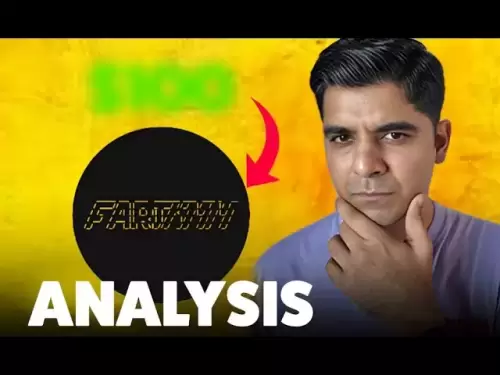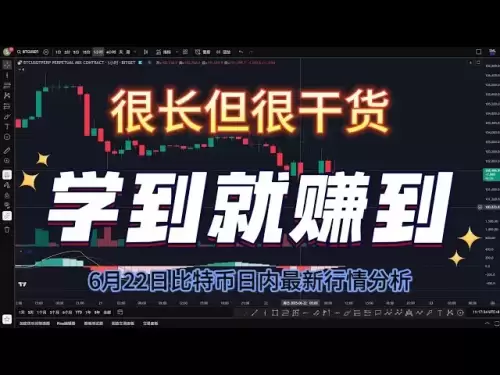 |
|
 |
|
 |
|
 |
|
 |
|
 |
|
 |
|
 |
|
 |
|
 |
|
 |
|
 |
|
 |
|
 |
|
 |
|
Cryptocurrency News Articles
Crypto Market Jitters: Iran Airstrikes Send Ethereum Altcoins Tumbling
Jun 22, 2025 at 05:00 pm
Geopolitical tensions after US airstrikes on Iran rattle the crypto market, with Ethereum and altcoins feeling the heat. What's next for crypto?

Hold onto your hats, crypto enthusiasts! The past few days have been a rollercoaster, with geopolitical tensions adding a whole new layer of complexity to the already volatile crypto market. Let's dive into the heart of the matter: How do Iran airstrikes impact the Crypto market, especially Ethereum and Altcoins?
Airstrikes in Iran: A Shock to the System
This weekend, news broke of U.S. airstrikes on Iranian nuclear facilities, authorized by former President Donald Trump. The move follows escalating tensions between Israel and Iran, and the potential for broader conflict is causing ripples across global markets. According to blockchain analytics firm Santiment, social media mentions of "Iran" exploded after the news, indicating investors are on high alert.
Bitcoin Holds Steady, Ethereum and Altcoins Feel the Pain
Interestingly, Bitcoin has remained relatively stable amidst the turmoil. Some analysts attribute this to the timing of the airstrikes, which occurred during a typically quieter market period. However, Ethereum and altcoins haven't been so lucky.
Ethereum dipped below the $2,300 support level, dragging many altcoins down with it. Several Layer 1 and DeFi tokens are experiencing daily losses, as traders brace for potential global conflict. Altcoins often suffer more during geopolitical uncertainty, as investors tend to rotate out of riskier assets into Bitcoin or stablecoins.
The CLARITY Act: A Beacon of Hope Amidst Regulatory Uncertainty
Adding another layer to the crypto narrative is the ongoing debate surrounding regulation in the U.S. The Digital Asset Market CLARITY Act (H.R. 3633), advanced by the House Financial Services Committee, aims to classify tokens by their function rather than how they're marketed. This bill could bring much-needed clarity to the regulatory landscape, potentially fostering innovation and protecting investors from scams.
The CLARITY Act is designed to regulate cryptocurrency like securities depends not on what the token does but on how it’s marketed or how investors (or speculators) treat it. Whether a token is a security depends on the Howey test, established in 1946 and designed to evaluate profit schemes on orange groves, not computer code.
What Does This All Mean?
The crypto market is currently walking a tightrope. Geopolitical tensions are creating uncertainty, while regulatory developments could reshape the industry's future. The next 24 to 48 hours could be crucial, with market movements potentially intensifying as Western markets react to the news.
My Two Satoshis
While it's impossible to predict the future, it's clear that staying informed is more important than ever. Keep an eye on Santiment's social data to gauge market sentiment, and pay attention to any developments in the regulatory space. Personally, I believe that the CLARITY Act could be a game-changer, providing a clear framework for innovation and attracting legitimate businesses to the U.S. market. The current system is a mess, and fixing it is the right step forward.
The Bottom Line
So, what's the takeaway? The crypto market is facing a complex situation, with geopolitical tensions and regulatory uncertainty adding to the inherent volatility. It's a wild ride, folks, but that's what makes it so darn exciting, right? Keep your wits about you, stay informed, and remember to buckle up!
Disclaimer:info@kdj.com
The information provided is not trading advice. kdj.com does not assume any responsibility for any investments made based on the information provided in this article. Cryptocurrencies are highly volatile and it is highly recommended that you invest with caution after thorough research!
If you believe that the content used on this website infringes your copyright, please contact us immediately (info@kdj.com) and we will delete it promptly.
-

-

-

-

-

-

-

-

-

- Fartcoin Frenzy: Whale Games, Liquidation Traps, and the Future of Meme Coins
- Jun 22, 2025 at 11:25 pm
- Is Fartcoin the next Dogecoin, or is it just a pump-and-dump scheme? We dive into the latest whale activity, liquidation events, and market trends to uncover the truth behind this controversial crypto.





























































